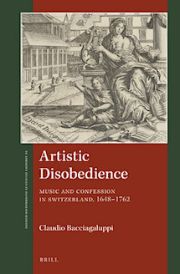Confessional singing
Claudio Bacciagaluppi has investigated how music differed between the Catholic and Reformed estates of the Old Swiss Confederacy and how exchanges took place far removed from the positions of the authorities.

How did the intellectual exchange function in the Old Swiss Confederacy, which had been divided into two confessional camps since the Reformation? There were disputes and sometimes even battles - which were then calmed down with a "land peace". But how "segregated" were the cantons culturally? How open or closed-minded were they musically?
The musicologist Claudio Bacciagaluppi, who comes from Lombardy and was educated in Zurich and Fribourg, is a member of the Swiss RISM (Répertoire International des Sources Musicales) and is therefore able to research these questions in detail. What was the relationship between music and denomination in Switzerland between the end of the Thirty Years' War in 1648 and the founding of the non-denominational and enlightened Helvetic Society in Schinznach-Bad in 1762?
It can be assumed that the music differed significantly simply because of the liturgies. But what if a Zurich resident liked the novel Italian drive and its catchy melodies? Officially, i.e. at the level of representation, the confessional worlds were separate. Underneath, however, in the flourishing municipal music societies and Collegia Musica, for example, a lively exchange took place. The "rigid morality" imposed from above was balanced out in the private sphere by "oases of comparative relaxation". In other words, people sang to each other - across denominational boundaries.
To speak of "artistic disobedience" may seem somewhat exaggerated - as if the Collegia had indulged in musical subversion. And yet, Bacciagaluppi emphasizes, such unorthodoxy should not be regarded as a "quantité négligeable". In the underground, music contributed to a pragmatic understanding between the denominations and to religious tolerance, as was then reflected in Johann Caspar Lavater's In praise of Helvetic harmony of 1767 formulated: "He who loves God and is honest / May call himself what he will; / Brother he is, and a Christian!"
The author presents all these developments and endeavors in a prudent and intelligent manner - unfortunately in English (for such an eminently German-Swiss topic), but written in an easily understandable way. Illustrations and a collection of contemporary (German-language) documents complement the presentation, so that one can also immerse oneself sensually (albeit without the music) in that era.
Claudio Bacciagaluppi: Artistic Disobedience. Music and Confession in Switzerland 1648-1762, St Andrews Studies in Reformation History, 263 p., ill., € 105.00, Brill, Leiden 2017, ISBN 978-90-04-33075-7








